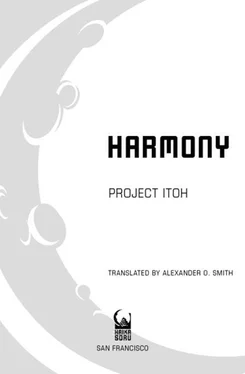Itoh, Project - Harmony
Здесь есть возможность читать онлайн «Itoh, Project - Harmony» весь текст электронной книги совершенно бесплатно (целиком полную версию без сокращений). В некоторых случаях можно слушать аудио, скачать через торрент в формате fb2 и присутствует краткое содержание. Год выпуска: 2010, Издательство: Haikasoru/VIZ Media, Жанр: Старинная литература, на английском языке. Описание произведения, (предисловие) а так же отзывы посетителей доступны на портале библиотеки ЛибКат.
- Название:Harmony
- Автор:
- Издательство:Haikasoru/VIZ Media
- Жанр:
- Год:2010
- ISBN:нет данных
- Рейтинг книги:4.33 / 5. Голосов: 3
-
Избранное:Добавить в избранное
- Отзывы:
-
Ваша оценка:
- 80
- 1
- 2
- 3
- 4
- 5
Harmony: краткое содержание, описание и аннотация
Предлагаем к чтению аннотацию, описание, краткое содержание или предисловие (зависит от того, что написал сам автор книги «Harmony»). Если вы не нашли необходимую информацию о книге — напишите в комментариях, мы постараемся отыскать её.
Harmony — читать онлайн бесплатно полную книгу (весь текст) целиком
Ниже представлен текст книги, разбитый по страницам. Система сохранения места последней прочитанной страницы, позволяет с удобством читать онлайн бесплатно книгу «Harmony», без необходимости каждый раз заново искать на чём Вы остановились. Поставьте закладку, и сможете в любой момент перейти на страницу, на которой закончили чтение.
Интервал:
Закладка:
Professor Saeki scratched his head and chewed his lip. “That’s perplexing. Mind telling me why the sudden interest in finding your father?”
“Actually, I’m not that interested in my father. What I want to know is what happened to Miach. You’re aware of the mass suicide the other day?”
“Over six thousand people across the planet killed themselves at exactly the same time. Show me someone who doesn’t know about it.”
“Well, I think Miach Mihie was involved, and before you remind me, yes, I know she’s been dead for thirteen years.”
Keita Saeki was silent. A hard look came into his eyes. “If that’s what you want to know about, you should talk to the woman who was working as Nuada’s assistant in Baghdad. Name of Gabrielle Étaín. She’s in the Baghdad labs of the SEC neuromedical consortium. Nuada and Gabrielle worked there together.”
“What were they working on?”
“Do you really need to know?” he asked. I could see his mind racing behind his eyes.
“I’ll be the judge of that. If I have to, I can get a warrant from the Japanese police.”
The professor stared at me, his mouth hanging slightly open. This wasn’t my first time at the negotiation table, and I wasn’t going to let some eccentric scholar locked up in his ivory tower talk me out of getting the information I wanted.
“It seems as though Nuada’s daughter has only grown wilder with age.”
“It’s an occupational disease. There are worse symptoms, if you care to see them.”
“That’s quite all right. I frighten easily enough,” the professor said. He called up a command pad on his desktop screen and began downloading data from someplace. He indicated the desk, so I reached out and touched it to do the transfer.
A densely packed scientific paper began scrolling at high speed through my AR.
“I don’t have time to read all this and you know it.”
“Call it my little way of getting back at you.”
“Um, excuse me?”
“I’m kidding, mostly. Let me sum it up for you. The paper is concerned with human will. A certain Russian researcher was able to use a psychological simulation based on these data to create a fairly detailed model of how the human will works.”
The professor pulled up a 3-D image embedded in the paper. It was a small picture of the brain that now began to rotate in my AR. A narrow wedge of it was blinking.
I pointed. “What’s that?”
“Part of the mesencephalon, the midbrain,” he said. “This is the part that governs the feedback system in our brains. Put simply, it processes the signals that motivate us to do things. Every action, no matter how small, has its associated reward. In most cases it’s a simple sensation of pleasure or fulfillment. If I have sex I will feel good—that’s a very simple, extreme example. Actually, my explanation is slightly off, but all you need to know is the general concept here. What I’m talking about is the range of feedback, great and infinitesimally small, that inspires us to repeat certain choices. This reward system creates a vast variety of motivating desire modules that compete for our attention. We call the act of choosing between these modules our will .”
The professor looked at me as if to ask whether I understood. I motioned for him to continue.
“Picture, say, a conference room. Real or in an AR session, it doesn’t matter. There’re all these people there and they’re all clamoring for this or that, until they boil things down to a collection of salient points and come to a conclusion. Think of the desire modules we all carry around as the people in that meeting, trying to get their opinions heard. When we think of human will, it’s common sense to think of it as a single existence or an all-discerning soul. But it’s not. It’s the heated debate, the shouting and the name-calling. It’s the process itself. The will isn’t one thing, it’s all of your desires clamoring for attention—that very state of being. Humans forget that we are a collection of disparate fragments and go around calling ourselves ‘I’ as though we were one immutable entity. It’s comical, really.”
“And this paper models that system?”
The professor dropped his display and leaned forward on his desk, nodding. “It does. When Nuada read this, he realized that if you could influence the various elements in a person’s feedback system, you could influence their will. Even control it.”
Controlling a person’s will?
I appreciated the professor’s finesse in saying something of such dire import with all the nonchalance of someone discussing the weather.
“Desire is very closely linked to reward. If the reward associated with a particular desire is slight, it reduces our will to act on that desire, and it becomes very hard for that particular desire to take the floor in that meeting of modules I talked about. People change their minds all the time. It’s the differences in reward levels that change our will, and it’s all mapped out. We even know how the feedback system interacts with different parts of the brain. The only problem was creating the medicules that could act on this knowledge. There needed to be a way to get the troops into the battlefield, which is the midbrain in this case.”
A light went on in my head. “Past the blood-brain barrier.”
“There is that, yes. But that’s only one of the problems involved. In any case, that’s what Nuada went to Baghdad to study.”
Controlling people’s desires.
Controlling people’s wills.
If you could sweep up all the fragments that made up our souls and lock them together like pieces of a puzzle, could you make a perfect person? What kind of person would that be?
Not someone like Miach. Not someone like me.
Miach had implored us to show our lack of value to the world. The day they figured out how to completely control a person’s will, the point would be moot.
I pictured a world of people all living together in perfect harmony.
A perfect society, run by perfect people, perfectly.
Our collective medical society was a good start in that direction. All it lacked was the tool sufficient to finish the job. My father had left myself and my mother and Japan to go to Baghdad to find that tool. To fashion a scalpel sharp enough to cut souls.
“Don’t take this the wrong way, Tuan, but the prospect of being able to fiddle with a person’s soul makes for a very attractive research project.”
The professor scratched his head, averting his eyes from me, as though he felt he shared a bit of my father’s guilt. His gaze drifted to the row of pink-leaved trees outside the window. “You can’t wave a good idea like this in front of a scientist and expect them not to reach for it. I’m not condoning what he did to you and your mother, but I’d be lying if I said I didn’t understand what it’s like to be a scientist in his position—and why he left you to go to Baghdad.”
“I understand what you’re saying, professor. But you’re not my father. His sin is his and no one else’s.”
I looked away, my eyes wandering until they found a yellow square among the floppy disks scattered across the floor. There was a label on the front of it with some kind of logo and an illustration like one from a children’s book. Probably some kind of game in its day.
“Someday, that will be us lying there,” the professor said quietly. I looked up, not understanding.
“Dead media. Relics of a bygone age.” He leaned back in his chair. “You’ve read those science fiction stories where humans manage to digitize the consciousness and upload themselves to some computer network. We do that, and our bodies will be nothing but antiquated dead media as far as our souls are concerned. It’s not hard to imagine a few soulless bodies lying around between the piles of magnetic tape and flash memory cards in my office once we evolve our consciousness beyond the need for the flesh.”
Читать дальшеИнтервал:
Закладка:
Похожие книги на «Harmony»
Представляем Вашему вниманию похожие книги на «Harmony» списком для выбора. Мы отобрали схожую по названию и смыслу литературу в надежде предоставить читателям больше вариантов отыскать новые, интересные, ещё непрочитанные произведения.
Обсуждение, отзывы о книге «Harmony» и просто собственные мнения читателей. Оставьте ваши комментарии, напишите, что Вы думаете о произведении, его смысле или главных героях. Укажите что конкретно понравилось, а что нет, и почему Вы так считаете.












